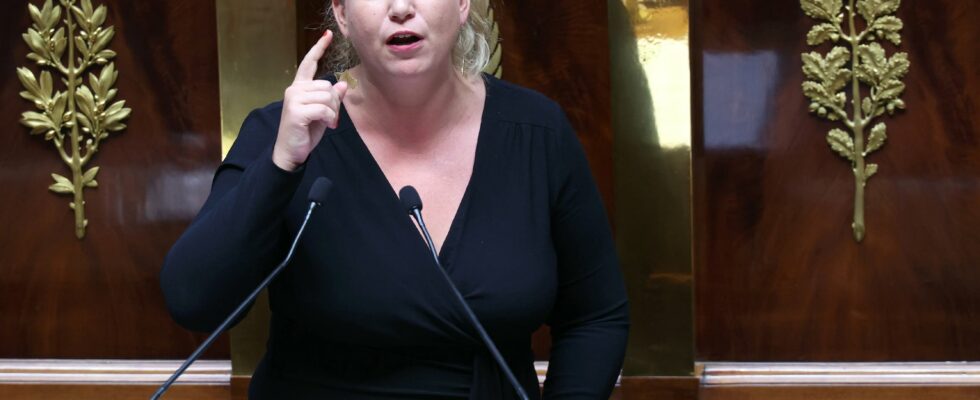This is a new stone in the water. Sunday, November 24, the boss of the La France Insoumise deputies, Mathilde Panot, declared that she wanted to “remove “the offense of glorifying terrorism” from the Penal Code. For the political group located on the left on the political spectrum, the objective is to “put” him in his place: “It turns out that before 2014, before the law which put the apology for terrorism in the Penal Code, it was in press law. And what we are denouncing is precisely that it is in the Penal Code and no longer in press law,” she explained. on BFMTV.
The apology of terrorism “consists of presenting or commenting favorably either on terrorism in general, or on terrorist acts already committed (for example: a person who wears a t-shirt displaying the inscription “born on September 11, I am a bomb “can be sentenced for advocating terrorism)”, recalls the service-public.fr website. Furthermore, supporting the perpetrator of a terrorist act also amounts to advocating terrorism. Same thing if an individual has “equal consideration” for the victims and perpetrators of terrorist acts. Another element that must be taken into account: the author of his remarks must speak in a public place or during a public meeting. For example, during a speech, in leaflets, on social networks…
The movement into the Penal Code of the offense of glorifying terrorism was recorded in article 4 of a law promulgated in November 2014 and decided by the then Minister of the Interior, Bernard Cazeneuve. The objective: to be able to apply extended limitation periods and more flexible procedural rules provided for in the exceptional regime in terrorist matters. At the time, the eyes of the world were fixed on Syria and Iraq, where a jihadist group with Salafist ideology, called Daesh, unilaterally proclaimed the establishment of a caliphate on a territory straddling the two countries. While many Europeans are joining their ranks, the question of terrorism is omnipresent on TV sets and in political debates.
An offense defended by the government at the height of Daesh
If the provision had been contested by several socialist and environmentalist deputies as well as some UMP elected officials (the former name of the Republicans), Bernard Cazeneuve had defended the article as “necessary” in the face of “the media strategy” of jihadist groups and in fact that “The Internet offers the most extreme theses a multiplied sounding board”. He also affirmed that “to suggest that freedom of the press is threatened is an absolute untruth.” On November 13, 2014, a year before the Bataclan attacks, article 421-2-5 of the Penal Code punishes the fact of “directly provoking acts of terrorism or publicly advocating these acts” with “five years’ imprisonment and a fine of 75,000 euros”.
Ten years later, the deputy of the North Ugo Bernalicis, at the initiative of the bill tabled on Tuesday, considers that this offense has no reason to exist. For him, the law of July 29, 1881, which deals with “facts relating to the offenses of apologizing for crime, apologizing for war crimes, apologizing for crimes against humanity”, is sufficient on this subject.
He cites the case of Jean-Paul Delescaut, secretary general of the CGT departmental Union of the North: on April 18, 2024, he was sentenced to one year in prison by the Lille criminal court for “apology of terrorism”. Three days after the Hamas attack on Israel, on October 7, 2023, he wrote on a leaflet: “The horrors of the illegal occupation have accumulated. Since Saturday, they have received the responses they provoked.” After the announcement of the verdict, the general secretary of the CGT, Sophie Binet, had denounced on the X platform a “shameful judgment” representing “a very serious milestone reached in the repression of freedoms”.
“Nothing to do with our personal interests”
But there are also examples in the ranks of the Insoumis, such as Mathilde Panot and Rima Hassan, who were questioned in April by the Parisian judicial police as part of investigations for “apology of terrorism”. Mathilde Panot was interviewed by the Parisian judicial police regarding a press release published by her group on October 7, 2023, in which the Hamas attack in Israel was described as “an armed offensive by Palestinian forces” in a “context of intensification of the Israeli occupation policy” of Palestinian territories. However, the head of the LFI deputies repeated it on Sunday: this proposal has “nothing to do with our personal interests”.
Within the government, the announcement of the Insoumis provoked an outcry. The Minister (LR) of the Interior Bruno Retailleau, for example, judged it “difficult to do more despicable”. Her colleague Anne Genetet, Minister of National Education, sees it as a “free pass to the preachers of hatred to threaten our teachers, our school leaders and all our staff”. And the disagreement also interfered on the left since the first secretary of the Socialist Party Olivier Faure judged that it was enough in this matter to refine “the definition” of the offense “to avoid abuses”. More clearly, the boss of the PS deputies, Boris Vallaud, affirmed that he did not support “the LFI proposal”.
